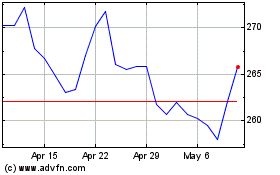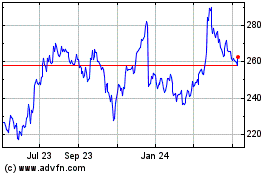FedEx Aims for Fuel Efficient Fleet - Analyst Blog
May 17 2012 - 5:30AM
Zacks
FedEx Corp.
(FDX) announced that its division - FedEx
Express has achieved 16.6% fuel efficiency in its transportation
fleet. FedEx has set a goal of making its fleet 20% more fuel
efficient by 2020. Thus, this recent development is a key step
ahead in achieving the target. In addition, the company stated that
20% of FedEx Express diesel vehicle fleet has been modified to
adhere to the 2010 U.S. Environmental Protection Agency diesel
emission standards.
The company announced that it is
taking several steps toward making its fleet more fuel efficient
and environment friendly. Among the initiatives, the company
is increasing the number of its green fleet to 130 by adding 87
electric trucks. It is purchasing vehicle of right-sized engines
like those manufactured by Mercedes-Benz. FedEx expects that
over 35% of its U.S. pick-up and delivery fleet will be equipped
with 11, 000 such vehicles by end of 2013.
Moreover, the company plans to add
114 Reach truck with composite body along with apt engine size that
would curtail fuel requirements by approximately 35% compared to
conventional vans. Initiatives also include testing of hybrid
hydraulic parcel delivery vehicles of FedEx Ground to reduce fuel
usage by 40%. Finally, testing six delivery vehicles reinstalled
with electric drivetrains from suppliers is also one of company’s
initiatives.
Separately, FedEx is also taking
several initiatives including reducing flights and frequencies as
well as redeploying equipment in other networks to reduce costs.
FedEx will buy 27 Boeing 767-300 freighter planes to replace the
old MD10s over the next few years. The first aircraft is expected
to arrive in 2014, with six additional planes per year from
2015-2018. The new freighter planes are 30% more fuel efficient
than the older ones and would lead to a 20% reduction in operating
costs.
Further, FedEx delayed the delivery
of eleven 777 freighter aircraft that were scheduled to be
delivered between 2013 through 2018. We believe the delayed
deliveries would help FedEx to better utilize the MD-11 fleet on
international flights and chop down the overall costs and
investments in the short and long term. Additionally, this network
restructuring would provide significant fleet efficiency gains in
the long term.
In 2010, Federal Corporate Average
Fuel Economy (CAFE) set a fuel economy standard of 34.1 miles per
gallon. This indicates the growing importance of eco-friendly
transportation. Several companies, especially those involved in
transportation and logistic services like FedEX and United
Parcel Service, Inc. (UPS), are increasingly realizing the
benefits of fuel efficient vehicles. If the Fed policies are
implemented, market researchers estimate that average consumer
would save an additional $3,000 on fuel cost over the life of a
vehicle.
Consequently, we believe that
FedEX’ goal of improved fuel efficiency is a significant step
toward exercising significant cost control, which can be achieved
through sustainable transportation.
Currently, FedEx retains a Zacks #3
Rank (short-term Hold recommendation). We also reiterate our
long-term Neutral rating on the stock.
FEDEX CORP (FDX): Free Stock Analysis Report
UTD PARCEL SRVC (UPS): Free Stock Analysis Report
To read this article on Zacks.com click here.
Zacks Investment Research
FedEx (NYSE:FDX)
Historical Stock Chart
From Mar 2024 to Apr 2024

FedEx (NYSE:FDX)
Historical Stock Chart
From Apr 2023 to Apr 2024
